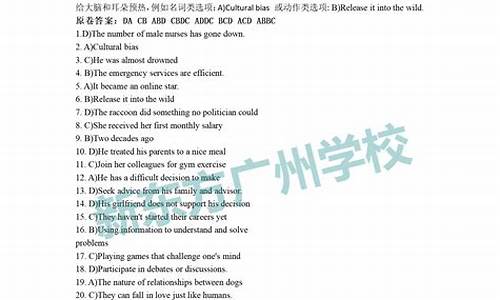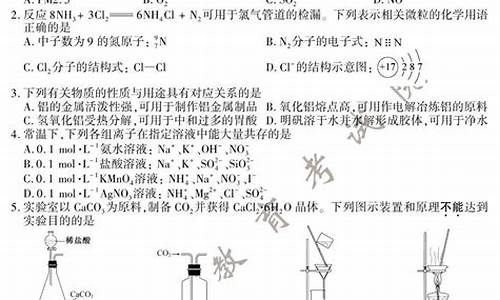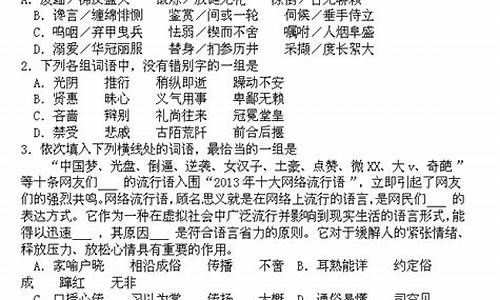您现在的位置是: 首页 > 教育研究 教育研究
高考听力答案_高考听力答案什么时候公布
tamoadmin 2024-05-21 人已围观
简介1.2009年3月14号浙江高考英语(pets2)听力答案第一类:根据听力内容选择答语 如某题的选项有: A You are welcome B Thank you very much C Thank you all the same. 先回忆一下.A选项表示“不用谢”,所以听力内容大概为Thanks…/Thank you (for)…/It’s kind of you to…. 而B表示“谢谢”
1.2009年3月14号浙江高考英语(pets2)听力答案

第一类:根据听力内容选择答语
如某题的选项有:
A You are welcome B Thank you very much C Thank you all the same.
先回忆一下.A选项表示“不用谢”,所以听力内容大概为Thanks…/Thank you (for)…/It’s kind of you to…. 而B表示“谢谢”可以回答here you are / Can I help you等,C 仍然表示谢谢你,用于你询问别人,别人不知道的时候的回答。本题的听力内容为:I’m sorry,Idon’t know the way to the station,I’m new here. 故而答案应为C。
又如某一题的选项有:
A What a good idea. B With pleasure. C My pleasure.
我们来分析一下,在日常交际用语中A应该用于回答表示建议的句子。如 Let’s…/ Shall we …/ What about…/ Why not…等; B表示“乐意效劳”,常用于别人向你寻求帮助(Can you help me?)时的回答;而C表示不用谢,用于别人向你感谢时的回答。
而听力内容为:Shall we go to the theatre next Sunday? 故而答案应为A。
第二类:根据听力问题,选择答语
如某题的选项为
A It was sunny. B It was Tuesday. C It was January 22,2006.
我们来分析一下,A选项的问题应是What was the weather like?/ How is the weather? 时态应为过去时;B选项的问题应为What day was it …? 时态应为过去时; C选项的问题应为What was the date…? 时态应为过去时。而听力内容为 What day was it yesterday? 故而答案应为B。
又如某题的选项为
A Yes, there is. B Yes, there was. C Yes, there were.
根据这些内容选项A的问题应为 Is there…? B的问题应为Was there..? C的问题应为Were there …? 而听力内容为: Was there a dinosaur show in the Science Museum? 故而答案应为B。
第三类:听对话,每段对后有一个问题,根据对话内容和问题选出答案。某题的选项为:
A She is a nurse. B She is a worker. C She is a teacher.
我们可以从以上选项中看出,对话中谈论的主题应与she 的职业有关,这是我们在听力过程中应特别注意。
听力内容为:M: What does your father do ,Lily?
W: He teaches English just as my mother does.
Q: What does Lily’s mother do?
由此可见,答案应选C。
第四类:听短文,根据听力短文内容,在各题所给的A、B、C、D四个选项中选出一个选项。如某个听力短文有如下的问题和选项:
( )⒗ Where did the young boy's ball fall?
A. In the river. B. Into the net. C. Inside the house. D. In the street.
( )⒘ Why did the boy come back?
A. Because he wanted to get back his ball.
B. Because he wanted to say sorry to the lady.
C. Because he wanted to see the lady.
D. Because his father asked him to come.
( )⒙ Who was the man?
A. The boy's father. B. The boy's teacher.
C. The lady's husband. D. The man the boy asked to come.
( )⒚ Who did the man think the lady was?
A. The boy's mother. B. The boy's sister.
C. The boy's teacher. D. The boy's neighbor.
( )⒛ How much did the man want to fix the window?
A. $10. B. £10. C. ¥10. D. 100 jiao.
从这段听力所给出的问题及选项,我们不难看出,听力要求我们要将短文的地点、起因、人物和一些基本的事件信息要听得出来。所以我们在听的时候要特别留意这些内容。
而这个听力短文的内容为:(划线部分为我们的问题涉及内容)
A young boy was playing with a ball in the street. He kicked it too hard,(第16题) and it broke the window of a house and fell inside. A lady came to the window with the ball and shouted at the boy, so he ran away.(第17题) But he still wanted his ball back. A few minutes later he returned and knocked at the door of the house. As soon as the lady opened the door, he said, "My father is going to come and mend your window very soon."
After a few more minutes a man came to the door with tools in his hand, so the lady let the boy take his ball away. (第18题、20题)When the man finished mending the window, he said to the lady, "Ten dollars, please." (第19题)“ But aren't you the boy's father?”asked the lady, looking very surprised.
故而,答案应为16 C 17 A 18 D 19 A 20 A
又如我们有下面一篇听力短文:
根据所听短文内容, 判断下列句子的正(T)与误(F)。
⒗ The word "hello" is widely used in many countries.
⒘ Thomas Edison was the first man to use the word "hello" on the telephone.
⒙ Telephone was invented by Thomas Edison.
⒚ Edison was good at talking.
⒛ At first, people believed they could hear each other on the phone.
通过阅读上面5个句子,我们初步判断该听力短文与电话、电话用语以及人物Thomas Edison有关。结合我们学过的历史知识,我们知道电话不是Thomas Edison发明的,首先判断第18题为错的(F)。然后,听的重点在hello这个单词以及Thomas Edison身上了
而这个听力短文的内容为:(划线部分为我们的问题涉及内容)
(第16题)Maybe the word "hello" is used more often than any other one in the English language. Every one in the United States and other countries uses the word, again and again, every day of the week.
(第17题)The American inventor Thomas Edison is believed to be the first person to use "hello" on the telephone soon after the invention of it.
(第20题)At first, people began their words on the telephone with "Are you there?" They were not sure the small machine could really carry voices.
(第19题)Edison was a man of few words. He wasted no time. The first time he picked up the telephone, he did not ask if anyone was there. He was sure someone was there and only said "hello".
From then on, "hello" is often heard when you picked up the telephone.
故而,答案应为16 T 17 T 18 F 19F 20 F
总之,我们在作听力时应作到以下几点:
一、争取时间 提前审题。 领到试卷后应迅速浏览听力部分,尽快根据题干和选项预测可能出现的录音内容,努力寻求四个选项之间的差别,提高捕捉信息的准确度。
二、沉着答题 遇难不慌。 听力测试的时间是预先设定的,通常为12分钟左右。因此,要培养抢记内容的能力,如人名、地名、时间、数字等。特别是对那些一时拿不准、写不出的词要学会用音标或缩写词作快速记录,以便在录音结束后为自己创造追忆的条件。另外,如果在做题过程中遇到确实听不懂的,要舍得果断放弃,集中精力,作好后面的题,切不可揪住一点不放,因小失大。
三、仔细检查 理顺关系。听力结束后,不要急于做笔试题。要利用头脑中还保留的短暂记忆和记录的内容,对那些不太肯定的答案进行推敲并合理想象。相对而言,听力第二部分内容难度降低,比较容易得分,做短文理解题时应注意如下几点:(一)、听短文录音时要重在意会,不能搞逐字对译。要特别注意捕捉一篇短文开头的第一句或最后一句话,因为它们往往是该文中心思想所在的主题句。(二)、短文后所给的试题一般是紧扣考生所听到的内容按先后顺序编排的,因此可以根据所听有关内容的先后顺序来逐一考虑各题,以免理不清头绪,解答问题时张冠李戴。(三)、所给出的选项,选择标准往往是看其是否与所听内容吻合。如果仅根据有关语法结构上的基础知识就可判定选择答案的话,该试题就达不到考查听力理解的目的。四、听力结束后有些地方仍然没听清,在答题过程中切忌胡乱猜测,要依据自己已听到的部分内容和已掌握的知识和常识,通过分析、推理等找到最接近的答案。五、短文一般在听两遍的情况下,难以将所有内容全部记忆下来。因此听力前充分利用间隙时间,浏览试题有关书面材料,预测内容。在听力过程中要特别留意并记住有关的信息,提高答题的正确率。
2009年3月14号浙江高考英语(pets2)听力答案
2011 年 9 月 24 日浙江听力高考试题 1. What does the man thinkof watching TV? [A] It helps people kill time. [B] It makes people less active. [C] It keeps people well-informed. 2. What does the woman mean? [A] She’ll use her bike soon. [B] She’lent her bike out. [C] She’ll borrow a bike. 3. What does the man think of the woman? [A] She is poorly dressed. [B] She’s got too many dresses [C] She should buy a dress for Betty. 4. What’s going to be difficult for the man? [A] Making nice coffee. [B] Working at home quietly. [C] Choosing a birthday gift. 5. What are the speakers discussing? [A] Whether to go on a holiday. [B] How to pay for the house. [C] Whether to find a better job. 听下面一段对话,回答 6 和第 7 题。 6. Who is Mr. Li? [A] The woman’s co-worker. [B] The woman’s secretary. [C] The woman’s boss. 7. What does Mr. Li want to talk to the woman about? [A] A job offer. [B] A big sale. [C] A new department. 听下面一段对话,回答第 8 至第 10 题。 8. What is the man doing now? [A] Trying to find a job. [B] Traveling roundthe world. [C] Teaching English for money. 9. Where will the man be working? [A] In an Australian school. [B] In a shipping company. [C] In a foreign trading firm. 10. What will the speakers do together in the evening? [A] Go sightseeing in the city. [B] Eat in a Chinese restaurant [C] Have a home-made dinner.
听下面一段对话,回答第 11 和第 12 题。 11. What do the speakers decide to do? [A] Ask Carrie for help. [B] Buy a huge cake. [C] Play cards. 12. Who will probably get surprised at theparty? [A] Maggie. [B] The man. [C] Jackie. 听下面一段对话,回答第 13 至第 16 题。 13. What kind of families can be possibly chosen as home-stay families? [A] Good at cooking. [B] Close to the school. [C] With international background. 14. What can an international student expect in a home-stay family? [A] A bathroom of their own. [B] No choice of meals. [C]A shared bedroom 15. What is the main advantage of staying with a home-stay family? [A] Learning the language better. [B]Having more freedom. [C] Going to school early. 16. What should the student do to get along with the family? [A] Cook for the family. [B] Keep his or her habits. [C] Follow the house rules. 听下面一段独白,回答第 17 至第 20 题。 17. What’s the purpose of the program? [A] To plan a nice weekend. [B] To prepare for New Year’s Day. [C]To celebrate the start of a vacation. 18. What are the children going to do? [A] Look for the hidden gifts. [B] Hide around the building. [C] Have a group discussion. 19. What are the children required to do before going out of the building? [A] Wait at a corner. [B] Give their names at a desk. [C] Stay together with their parents. 20. Who will go out of the building through the double doors? [A] The preschool children. [B] The third grade children. [C] The fourth grade children.
2009年高考英语听力材料(2009.3.14)
第一节
1. W: Thanks for lunch. It was delicious. Next time it’s on me.
M: Don’t be silly.
W: I’m serious.
M: All right. Next time you treat.
2. M: What’s the chemistry homework Mr. Brown gave us today?
W: Just a minute. I’ll look it up in my notebook.
3. M: Did you listen to the weather report this morning, Helen?
W: Yes, it says we are going to have a wet weekend. We may get some very heavy rain in mountain areas.
M: That means we can’t go camping, but will have to stay in.
4. M: Hi, Maggie. I want all these books here.
W: That might be a lot for your dad to buy at one time.
M: My dad gets me all the books I want.
W: Well, that’s very nice of him.
5. M: Will you excuse me for a moment? I left my key in the car.
W: Certainly.
第二节
6-7小题
M: Bob Gordon speaking.
W: Hello, Bob. It’s Ann here. How’s everything?
M: Fine. How about you?
W: Oh, not so bad. Listen, I want to talk to you, Bob, about next Thursday. I hope you haven’t forgotten.
M: No, no. I’ve got it in my diary. Just look it up. Thursday, the14th, the meeting in Birmingham, don’t know when or where, though.
W: Right. That’s what Don White asked me to tell you. It’s in Birmingham at a quarter past eleven in the Rose.
M: The Rose Hotel?
W: Yes, the one opposite the park, Er, now you’ve got the time, right? 11:15, OK?
M: Yeah, fine, 11:15. I may be a few minutes late. There is a train from here at 8:10. I’ll take that one, which train are you getting?
W: I’m catching the 10:17. I get in at about 10:45.
M: OK. See you Thursday then. Cheer then.
W: Bye, Bob.
8-10小题
W: Meg, I’ve just got us tickets to Singapore.
M: That is just too exciting. So when do we set off?
W: The plane leaves tomorrow afternoon. So we need to set off for the airport at 11am.
M: Just let me write that down. So I don’t forget. So we leave at 11 am. Do we stop off anywhere on the way or is it a direct fight?
W: Well, there aren’t any direct flights. But we are very lucky. With these tickets we can stop off in Hong Kong. So we can stop and spend two days there on our way to Singapore.
M: You’re great. I always wanna go there. So we stop off in Hong Kong and just one more thing. When do we get back?
W: We’ll return home in 10 days’ time.
M: Wow, wonderful, I just can’t wait.
11-13小题
M: Have you booked a table, madam?
W: Yes, we’ve booked one for two. The name is Morrison.
M: Oh, yes, we have the table for you near the group. This way, please.
W: Group? What group? Oh, the music group, I suppose. I can’t stand the noisy places. Now where’s the menu?
M: It’s on the wall, madam, on the blackboard.
W: On the blackboard, indeed. I suppose you can’t afford proper menus.
M: I’m sorry, madam, but that’s what we always do.
W: I have such a busy afternoon in my office. If I weren’t so hungry, I would leave immediately.
14-17小题
W: How was the game, Bill? Did you enjoy it?
M: No, it was not interesting at all.
W: That’s too bad. Football games are usually exciting.
M: Not last night. Some of the players didn’t know what they were doing. In fact, one of them was just terrible.
W: Well, which team was the winner?
M: The Tigers, they won the game 3-1.
W: Were you happy about the score?
M: No, I cheered for the losers.
W: What about Eric and Steve? Which team did they support?
M: Well, Eric was for the Tigers, but Steve was for the Lions.
W: Then at least one of you liked the game.
M: Yes, all of us enjoyed eating something. I had a big box of popcorn and ice cream.
18-20小题
Hi, there, cow boys and cow girls. For a really exciting day in the Wild West, come to Cactus City Wild West Park. Yes, bring the children along to see a real old time pioneering town. Shoot guns and ride horses down the road. We’ll open April through September, seven days a week from10 am to sundown. Only 12 dollars for adults and 6 dollars for children or buy a family ticket at 24 dollars. What’s more, every Saturday and Sunday we have a real Wild West Show. Performances start at 2 pm and last for two and a half hours. That’s value for money. There are free buses to the park throughout the day every Saturday and Sunday from Cactus City Center. Yes, so we. There is a lot of fun waiting for all the family at Cactus City Wild West Park.
第一节
1-5小题
1. Who is paying the lunch now?
A. They share the bill B. The woman C. The man
2. Who are the two speakers?
A. Workers B. Students C. Teachers
3. What will the speakers do over the weekend?
A. Go camping B. Stay at home C. Climb mountains
4. Where are the speakers?
A. In a bookstore B. On a bus C. At home
5. What does the man ask the woman to do?
A. Get his key B. Start the car C. Wait for him
第二节
6-7小题
6. Why does the woman call the man?
A. To tell him the time and place of a meeting.
B. To tell him how to get to Birmingham.
C. To tell him to visit Don White.
7. Which train is the woman taking?
A. The 10:17 B. The 10:45 C. 11:15
8-10小题
8. When is their flight?
A. In the morning B. In the afternoon C. In the evening
9. Why do the speakers need to stop off in Hong Kong?
A. Direct flights are more expensive.
B. They plan to do some shopping there.
C. There are no non-stop flights to Singapore.
10. How long will the speakers be away from home?
A. Two days B. Ten days C. Twelve days
11-13小题
11. Where does this conversation take place?
A. In a concert hall B. In a restaurant C. In a theatre
12. How does the woman feel in the conversation?
A. Unhappy B. Curious C. Excited
13. What is the woman going to do next?
A. Start to work immediately B. Talk to the group C. Sit down to order
14-17小题
14. Why was Bill unhappy about the game?
A. Some players played poorly.
B. The scores were too close.
C. It lasted too long.
15. Who cheered for the Tigers?
A. Steve B. Bill C. Eric
16. What was the one thing Bill said he enjoyed?
A. His friends’ company.
B. Supporting his team.
C. Eating some food.
17. What do you know about the woman?
A. She knows Bill well.
B. She owns a restaurant.
C. She dislikes football.
18-20小题
18. What do you know about Cactus City Wild West Park?
A. A place to see cowboys and cowgirls.
B. A place for children to play in winter.
C. A fun place for the whole family.
19. When does the wild west show begin?
A. At 10 am weekdays.
B. At 2pm on weekends.
C. at 2:30 pm everyday.
20. When can people take free buses to the park?
A. On Saturdays and Sundays.
B. Throughout the week.
C. In the evening.
Key: CBBAC AABCB BACAC CACBA









